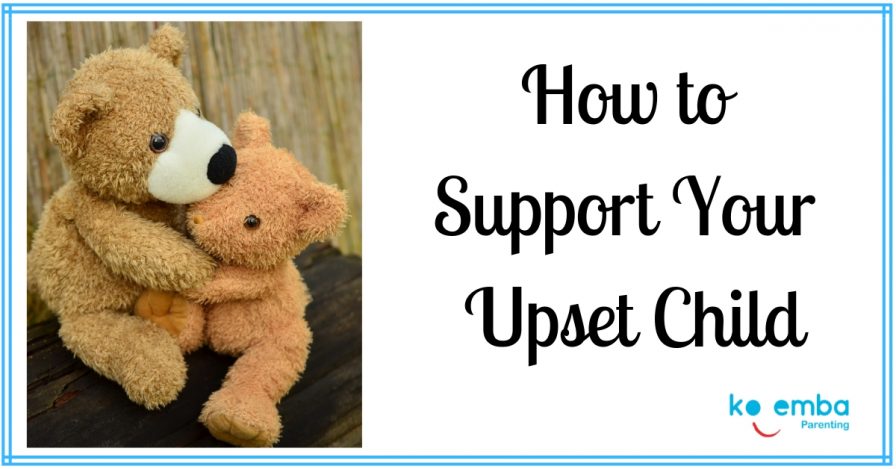When a child is going through a difficult time, it’s hard for a parent to know how to help. Here are five useful tips on how to support your upset child.
What can a parent do!
A key skill is to remain in “approach” mode.

In every relationship the other person experiences us as being in “attack”, “avoid’ or “approach mode”.
Samantha has been trying to stay in tune with her daughter over these past few days. She’s heard a deluge: I hate school, I haven’t got any friends, The teachers are stupid, Nobody cares. I don’t want to go to school.
How does a parent respond!
She takes a deep breath.
“Okay, Paula. So you don’t want to go to school. You can stay home tomorrow, BUT …”
Samantha takes a long, deep pause trying to figure out what she’s going to say. But she doesn’t get a chance.
“You’re just like them. You don’t care!” Her daughter slams out the room.
“What did I do wrong!” Samantha is mystified.
Samantha didn’t realise her child’s brain registered the long pause, followed by her heavy “BUT… ” as an “attack”.
The thing is, it’s not what we intend that counts – it’s the message the other person receives that will influence the interaction.
The thing is, when a child already feels overwhelmed it’s easy for them to misinterpret a parent’s signals and they can easily experience the parent as being in “attack” or “avoid” mode. This is only going to add to a child’s distress.
Your child’s unreasonable outburst may be upsetting, but realise it is exactly that – “un-reason-able”. The behaviour stems from the child being “unable to reason” because at times of high stress the “thinking brain” temporarily goes offline. The child snaps into a “fight or flight” reaction. Samantha’s prolonged, heavy pause was all that was needed for her stressed child to experience her as another attacker.

What Not To Do When Your Child Is Upset
#1 Don’t tell your child to “Be reasonable.”
Right now the deep, reactive “reptilian brain” has seized control. It’s impossible for your child to reason once they have dropped into this reactive state. Until she’s calmed down, she IS un-reason-able!
#2 Don’t try help your child find solutions whilst upset
It won’t work to try help your child find solutions whilst upset because the human brain cannot see options and imagine consequences while the “thinking brain” is “offline”. First connect and support your child to regain calm.
#3 Don’t tell her, “It’s not really such a big thing,” or “It will be all right.”
At this moment it doesn’t feel like it will ever be all right again. She’s hurting and her reptilian brain is registering “PAIN!”, which means your child can’t see beyond that point until she regains her calm.
#4 Don’t compare
E.g. “You used to like school.” “Your sister is happy there.”
Here earlier experience doesn’t negate what’s she’s feeling now. Somebody else’s experience isn’t hers.
#5 Don’t tell her to calm down
That’s like telling the cloud to stop raining. When this level of tension has been reached, the strong emotion will temporarily overwhelm.

So what can a parent do?
Five Useful Tips On How To Support Your Upset Child
TIP #1 Recognise your upset child is unable to reason
At this point, your child can’t see another point of view or imagine possible consequences to her actions until she has calmed down and returned to “whole brain thinking”. So don’t expend your energy trying to achieve the impossible!
TIP #2 Focus on remaining calm and in “approach” mode
Staying calm is the only way to park your own anxiety and keep your “thinking brain” online. And this matters because there needs to be at least one thinking brain online to find the way through the current upset! For more on this see my e-book “Stop Yelling – 9 Steps to Calmer Happier Parenting”.
TIP #3 Tune in to your child’s experience
If your brain is busy imagining the letter you will write to the teacher, what you’d like to say to those other kids, worrying that your child might drop out of school, then your brain is in another world and not focusing on your child’s world, which is where you can support her right now. There will be time to find solutions later. Right now focus on being present to your child and to her experience. Imagine crossing the bridge into her world experience and seeing the situation through her eyes.
TIP #4 Empathise with your child
As you tune in to your child’s experience seek to understand what she might be feeling. Anxious, lonely, angry, frustrated? Don’t try to “change” her feeling. Feelings are what feelings are. Once she has a sense of her life experience being understood and validated, she’ll sense you being in “approach” mode and then be able to calm down. (Even though that might not be immediate).
TIP #5 When your child is calm, use “What?” questions
Use “What?” questions to explore possible ways forward.: “What needs to happen now? ” “What can I do to support you?” “What else could help?”
(Not “Why?” questions – which tend to lead to blaming or excuse making).
Explore the options together and support your child to recognise the factors within her control, because these are the only things she can change.
“Difficult roads often lead to beautiful destinations.” Zig Ziglar
If you found this article helpful you will probably also enjoy reading:
How to Support Your Child If They Are Having Difficulty At School which gives the core principles of building TRUST in our parent-child relationship.
If you are facing a challenging situation concerning your child, why not work with me as your Parenting Coach. I can help you tune in to your child so you are in a grounded space to support your child to create collaborative solutions.
I’d love to hear your experiences about how to calm your upset child.
What has helped you to support your child when they are upset?
What is your greatest challenge in supporting your child through a difficult experience?
Your answers help me to create the posts you’d love to read.



No comments yet.